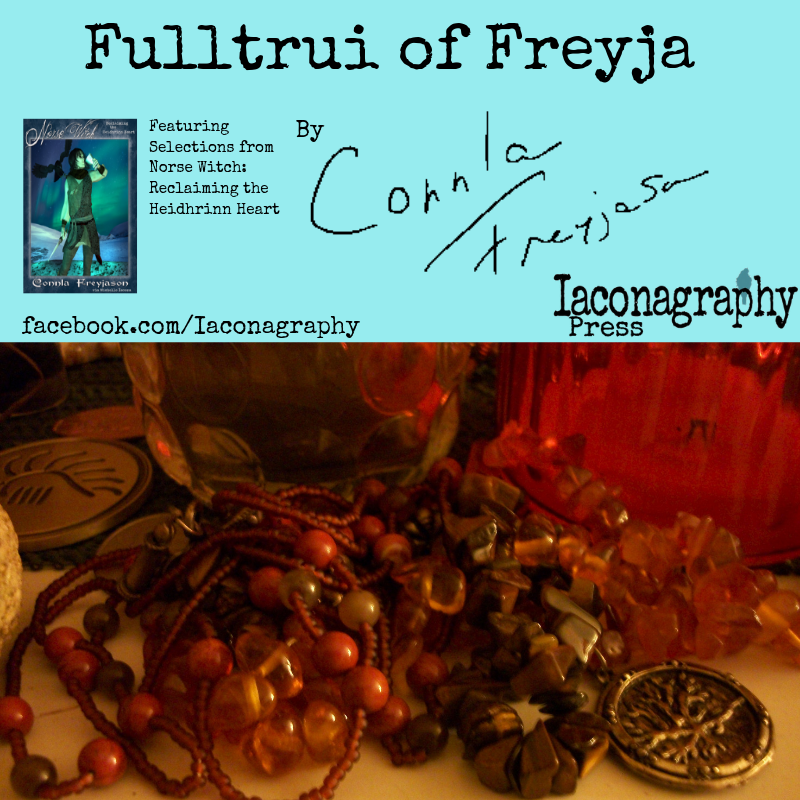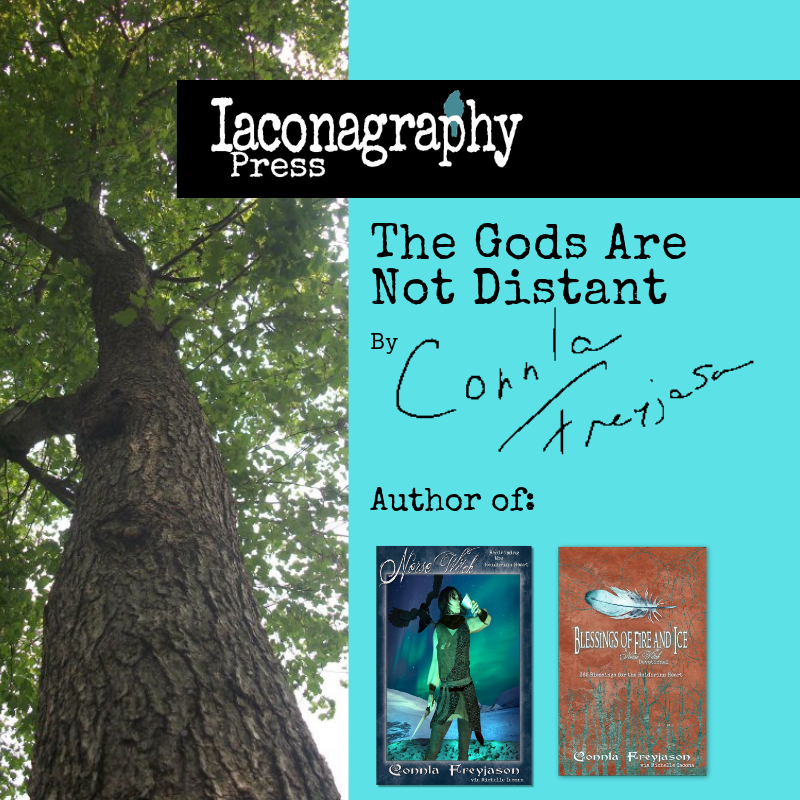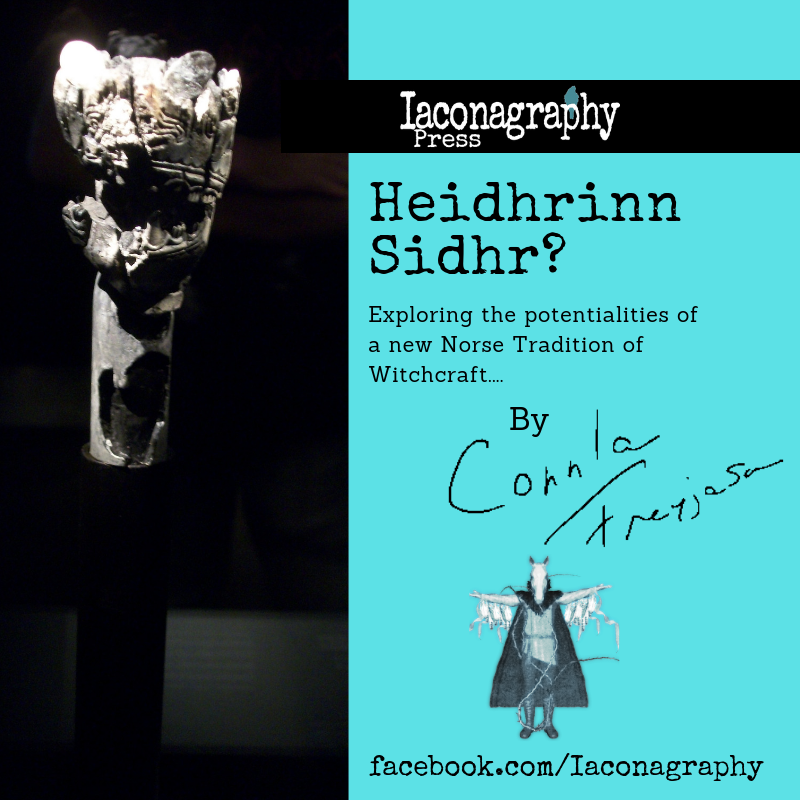Fulltrui of Freyja

Today marks my two-year anniversary, as Fulltrui of Freyja. Over the course of those two years, perhaps the question I have been most asked, and the blog-content that has been most requested, is information regarding first what it actually means to be fulltrui/fulltrua of a deity, and, second, how one enters into such a relationship. At risk of “spoilers” for my book, Norse Witch: Reclaiming the Heidhrinn Heart, and in celebration of this day, I thought I should finally answer some of those questions and meet those requests.
On the twenty-seventh of February in 2017, I finally realized that I should take the plunge, and dedicate myself to the “service” She had already chosen for me. It was time; She had told me so. Now the question became: how does one “perform” a dedication to a Deity in the Norse Tradition? I had no clue. Certainly, I had read about others who had done so and I knew that there was a certain measure of “contractual deal making” that took place within a ritual context when “finally taking the plunge” with a Norse Deity, but that was pretty much the extent of my knowledge on the subject, apart from my previous experience as a Welsh Druid. Still, I wasn’t exactly “going in blind”: I had, after all, spent the last year getting to know Her better, both in a ritual setting (during our Friday blot), and in a research capacity. So I did what I almost always do with everything that I’m passionate about in my life: I jumped in with both feet. I also did as I was told.
How do you know when the Gods are telling you to do something? Sometimes it may come as it does when any physical person tells you to do something: in the form of an audible voice. Other times, like that night when I became fulltrui, it may come in the form of a burning need. Suddenly, you feel driven to do something, with every fiber of your being, often to the point of actually feeling physically ill if that thing is not done.
Dedication to a specific deity is not something undertaken by all followers of the Norse Faith or even of Heidhrinn Sidhr, although there is certainly significant historical evidence that some (though likely not all) of our Ancestors definitely engaged in such relationships. Some people argue that such relationships are simply a comfortable “mimic of monotheism” for those stepping from a former monotheistic faith into a profoundly polytheistic one, and for some people, that may indeed be true. However, in our Heidhrinn Faith, dedication to or patronage of a particular Deity neither precludes nor excludes acknowledgment and veneration of any or all of the others. Instead, our fulltrui and fulltrua (masculine and feminine, respectively) relationships with our Gods and Goddesses place us in the unique position of recognizing not only our place in the Universe-at-large, but Theirs as well.
Unlike the patron/dedicant relationships found in other faiths (including Catholic Christian relationships to saints), the fulltrui relationships formed in Heidhrinn Sidhr are very much a cooperative process. Whereas in other faiths the patron/dedicant relationship tends often towards a sort of benign master/servant motif (with Deity as master, and dedicant as servant), in our Heidhrinn Faith, the fulltrui relationship is understood more as a full partnership. In fact, the word fulltrui translates literally as “representative, agent, or trusted friend”. As such, I understand myself not as a servant of Freyja, but as a representative of Her best interests in this modern world; as an agent of those things which She attempts to put forth in this world (ecstasy in all its varieties, including religious ecstasy; magick as a form of service to others; overarching love; honoring self-esteem, etc.). When I use the language of “service”, it is within the context of being Her representative and agent. I also understand myself as a trusted friend who actively loves their Friend and who is actively loved by that Friend in return.
Developing and maintaining friendships with the God/desses works very much like developing and maintaining friendships with any other mundane human being. I would offer the same caveat when discussing fulltrui relationships that I would offer when speaking of any human-to-human friendship: do not offer your friendship lightly. A fulltrui relationship with a God sought simply because it’s the “cool” or “en vogue” thing to do is the same as seeking friendship with the “popular kid” at school, simply based on that person’s popularity: I would advise neither. If the latter can potentially lead to fakery and heartbreak, imagine what the former could lead toward? Freyja chose me, rather than the other way around, but it is not unheard of for people to choose Whom to court as fulltrui: just make sure you are doing so for the right reasons! While being fulltrui of Thor may “sound cool”, consider the very real ramifications of such a relationship in the same way as you would when considering becoming the “besty” of a mundane person with similar traits as Thor. If that still feels like a “good fit”, then do exactly what you would do when seeking the friendship of a mundane similar to Thor, and see how Thor feels about your potential as fulltrui, for such relationships with the Gods can no more be forced than such relationships with other humans.
At times, our fulltrui relationships may place us in positions of service to other humans, as we act as the representatives and agents of our partnered God/dess, but never forget: you are not an employee. Instead, you are a co-worker, in much the same sense as members of the United Nations are ultimately co-workers, working alongside each other, and alongside their country-of-origin, for the “greater good”. You are a representative of your partnered God/dess, and as such, you are expected to behave in partnership with Them. For example, as a dedicant in a fulltrui relationship with Freyja (Freyja is my fulltrua—feminine–and I am fulltrui of Freyja—masculine, as I’m a dude), I act as Her representative when I promote a positive and accurate image of Who She Is here in our mundane world. I act as Her agent when I perform such services as oracle and rune readings for people as a service to them: I understand that She is not “speaking through me” or otherwise “working through me”, but instead that She is speaking to me on occasion, so that I may relay Her messages to others. These services fall under the heading of working as an agent of Freyja because She ultimately governs such areas as ecstatic religious experiences (which I undertake with each reading, as I enter the Alpha state), building self-esteem (which I use these services to foster in my clients), and, ultimately, as a vitki and Freyjasgodhi. On the other hand, if I was fulltrui with Thor, I might still behave as His representative when I promoted a positive and accurate image of Who He Is here in our mundane world, but my actions as His agent would likely take on very different forms: I might be someone who translates things into plain speech for laymen, for example.
Behaving in a manner that is contrary to your fulltrui relationship with a specific Deity can have dire consequences, in much the same way that acting contrary to a formed human relationship might. That there is a possibility of behaving contrary to a fulltrui relationship with a specific Deity implies that certain taboos are put into place at the start of said relationship. Breaking oaths would naturally be taboo within the scope of a fulltrui relationship with Tyr. Meanwhile, within a fulltrui relationship with Loki, breaking oaths might not be so deeply frowned upon, but taking yourself too seriously definitely would be. Most of the time these taboos are implied by the areas over which a specific Deity has governance; other times, they may be agreed upon (generally by oath-taking) between yourself and your fulltrui/fulltrua, based upon their areas of governance as those interact with our modern society. As Fulltrui of Freyja, the taboos implied by our relationship include never harming a cat or allowing a cat to come to harm (as cats are sacred to Freyja); never promoting hate, inclusive of racism or any other negative -ism; never allowing love to be viewed as “weak”, “soft”, or “un-warrior-like”; never simply standing by when a person is in very real need of help with their self-work, to promote healthier self-esteem, and never permitting the term “Wiccatru” to be spoken in my presence without speaking up to reclaim the title of Norse Witch for Norse practitioners. These taboos help to keep me actively working as Her agent in this world, by minimizing and attempting to crush hatred in the world while at the same time actively working to promote love and dispel the stereotypes that “love is a form of weakness” (She is a Goddess of Love but also of War and Death); being profoundly aware of when someone needs assistance in their own self-work with establishing better, healthier self-esteem (She is associated with establishing Healthy Self-Esteem, in Her capacity as a Goddess of Love), and reclaiming not only the titles associated with magick (such as “witch”) but also magick itself (for She is also Heidhr/Gullveig, and the Mother of Seidhr).
Just as healthy mundane human friendships do not “happen overnight”, neither should fulltrui relationships with a God/dess. Generally, before we proclaim someone as our “best friend”, we fully know what we are getting ourselves into, and that same caveat should definitely apply before remotely considering becoming fulltrui/fulltrua with Anyone. If you feel that you are not ready to seek a fulltrui/fulltrua relationship at this time, then don’t do it! You may also feel completely disinclined, for whatever personal reason, from ever seeking a fulltrui/fulltrua relationship: you’re not doing it wrong! These sorts of relationships aren’t for everyone, and they certainly are not necessary for you to live a perfectly fulfilling and fulfilled life as a Norse Witch/practitioner of Heidhrinn Sidhr.
Your actual Dedication as fulltrui/fulltrua is a deeply personal thing; therefore, what is provided in my book, Norse Witch: Reclaiming the Heidhrinn Heart, is only the loosest of guidelines. You should personally compose your own dedication. Unless your fulltrui is Odin or Bragi, They likely will not be judging you on your poetic prowess! How skilled you are with verse matters far less than that you cover every contingency, when it comes to the scope and parameters of the relationship you are about to cement. Do not make any promises which you do not fully intend to keep! Oaths and the fulfillment of vows are some of the cornerstones of our belief system; quite simply put, an oath is a promise, and a broken promise is a lie. An oath broken, ultimately, is a lie not only to another human, nor even to the family or tribe, but to the Gods Themselves. As you take this oath, it is important to remember that this is not an oath you are making to another human being from whom you might one day be separated in death; this is an oath you are making to the Gods—Gods who are going to know exactly where to find you when your end-of-days are at hand! The oath of dedication, taken at the official onset of a fulltrui/fulltrua relationship, is one of the most important oaths you will ever speak, so it is best to be certain to “cross every t and dot every i” when composing it, exactly as one would do if drawing up an actual legal contract. Be as precise and specific as possible, not only about what you are willing to do, but also about what you are not. And then live it. In order to do that, you must make sure that the conditions are, in fact, livable. If you have any doubts whatsoever about your ability to maintain such an oath at this time, do not make it. While I am not willing to say that you would not be able to “back out” of your oath at some point in future—as through an oath of abjuration—going into the fulltrui/fulltrua relationship based on such a possibility is the exact same thing as entering a marriage while harboring the thought “well, I can always get a divorce later”.
When composing your own oath of dedication, it is suggested that you begin with a statement of intent, followed by an identifying statement of who you are within the relationship. This may then be followed by a statement of where you currently stand (what you currently are doing, as fulltrui/fulltrua), followed by a promise of what you will bring to the relationship, and, where applicable, what you will not condone/do/accept/bring. Your oath should finish with a final declaration of your place within the relationship. And then you are expected to live as fulltrui/fulltrua, in much the same way as we live within the parameters of our close relationships with other human beings. For me, within the scope of my fulltrui/fulltrua relationship with Freyja, that means first finally accepting that I am, in fact, a vitki and Freyjasgodhi. Part of that acceptance includes doing things like writing books, making art, and actually helping people, through compassionate counsel. I also am very well aware of being Her representative in this world, and I am thus always eager to educate others about The Lady, as well as being very attentive to how I carry myself in the public eye, as Her fulltrui. The parameters of your own fulltrui/fulltrua relationship may make profoundly different demands on your own life, dependent upon with Whom you are fulltrui/fulltrua.
Whether or not you ever personally decide to become involved in such a deep relationship, I hope this blog post (and my book) might be of some small help in assisting you with your decision, as well as providing a very basic “how-to”. I hope you will also join me, on this personally very special day, in raising a glass, a horn, or a chalice, in solemn blot to The Lady:
Hail Freyja, Queen of Cats:
Vanadis, Valfreyja, Mardoll, Gefn!
Praise to She, Who teaches us to love,
Not only others, but also ourselves;
Praise to She, Who reminds us that love
Requires the strength of the warrior!
With gratitude we pour this out
For lessons You have taught:
Of magick in our every waking moment;
Of miracles in each and every breath;
That Spirits long-dead may still quicken in the night,
Or walk the day in unexpected ways
To teach and be taught in kind.
Hail Freyja, Lady of both Love and War;
Hail Freyja, Lady of both Heart and Sword!

Bibliography
Lafayllve, Patricia M. A Practical Heathen’s Guide to Asatru. Llewellyn Publications, 2013.
Price, Neil S. The Viking Way: Religion and War in Late Iron Age Scandinavia. Oxbow, 2007.



